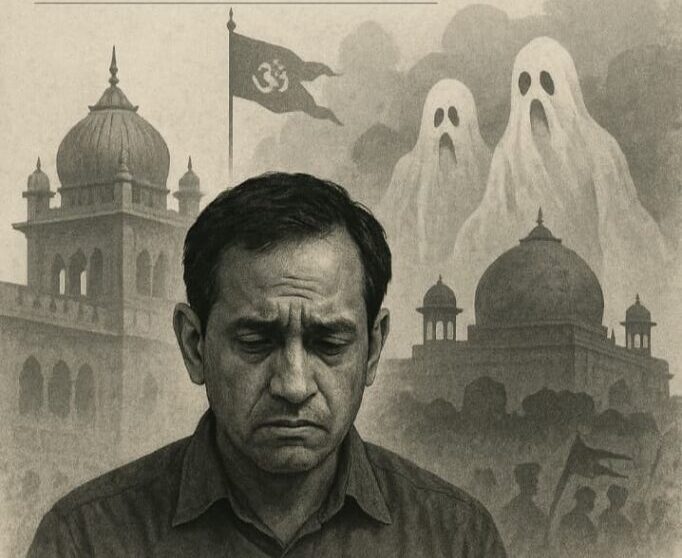Is India losing its way? worry grows as old ghosts stir
There’s just this vibe in India right now… you can feel it almost thick in the air. A deep kind of worry, making you feel like the ground beneath your feet isn’t quite steady anymore.
Ever since Prime Minister Modi took the reins, it seems like there’s this constant, strong pressure pushing a very specific Hindu-first way of thinking – what they call Hindutva.
It feels like it’s crowding out the more familiar, mixed way of life that India has always known.
This doesn’t just feel like politics as usual; it honestly feels like an attempt to change what it means to be Indian, chipping away at the idea, built up so carefully over decades, that everyone belongs equally, no matter their faith. And the really chilling thing? As this push for a ‘Hindu nation’ gets stronger, it feels like it’s dragging up the ghost of the terrible idea that led to Partition – the belief that Hindus and Muslims just couldn’t live together.
That’s the very idea India tried so hard to reject when it started.
Remember how people used to talk about India being this amazing mix of different cultures and faiths? That feeling, that pride, feels shaky now, like it’s under threat. And it’s not just talk; you see things happening.
Familiar city names suddenly get changed to ones that tell a very different story about the past. It can leave you feeling a bit lost, wondering what history matters.
It’s genuinely unsettling when the history books your kids study start to feel different from what you learned, like bits of shared memory are being quietly rewritten or even erased. You start to wonder – whose story gets told now? And whose gets left out?
Then there are things like the Citizenship Amendment Act (CAA) and the constant worry hanging over everyone about a potential National Register of Citizens (NRC).
These aren’t just complicated laws for politicians to argue about. If you’re part of a minority group, especially if you’re Muslim, these laws bring real fear.
A nagging worry starts: “Do I truly belong here anymore? Is my place safe?” It feels like a slow heartbreak for so many, almost like admitting defeat to Jinnah’s old, painful argument – making you question if that beautiful dream of everyone living together as equals was just that, a dream.
And the worry doesn’t stop there. People are paying close attention to what’s happening with Waqf properties – lands and buildings tied up with generations of Muslim history and community life. When you hear about new rules or government investigations, it’s hard for many not to see it as more than just paperwork. It feels like a deliberate attempt to question and maybe even take away a community’s living heritage, their connection to the place. It hits a raw nerve, bringing up fears of losing what little security they have, feeling even more like strangers in their own country.
Into all this tension, that recent attack in Pahalgam just exploded. Instantly, people everywhere – inside India and outside – started asking questions, whispering: Was this just a horrible security failure, or was it something staged, a ‘false flag,’ to whip up anger and create an excuse to hit Pakistan? The timing felt suspicious, didn’t it? It came right when Modi seemed to be dealing with problems at home – money worries, some protests here and there, signs maybe his support wasn’t rock solid anymore.
So, you see the tight spot he’s in. You hear the whispers, maybe even from people usually loyal to him, about how terrifyingly dangerous a real fight with Pakistan could be – the chaos, the lives lost. It’s unthinkable.
But at the same time, there’s huge pressure on him to look strong, to hit back hard. If he hesitates, after building up this image of a tough leader, people might see him as weak, and his political rivals could pounce. It feels like he’s caught in a terrible gamble, where staying in power seems to involve risking the safety and lives of millions.
Ultimately, this relentless push for a more Hindu-focused India does more than just change laws or street signs. It feels like it’s eating away at the very promise India was built on. By trying so hard to define who really belongs, it ends up sounding disturbingly like the very ideas it claimed to oppose.
As India keeps going down this road, that vision of a welcoming, diverse country feels further and further away, haunted by that awful thought: what if Jinnah wasn’t entirely wrong? The future feels heavy, full of incredibly tough choices. Will it be more confrontation, with all the awful risks that brings? Or will there be a change of heart back home? What happens next won’t just decide India’s future; the whole region is holding its breath.



